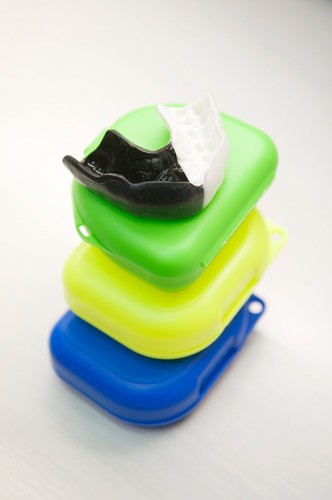Dental injuries in sport are common and can vary from soft tissue damage to chipped teeth or even complete loss of a tooth. A sports mouthguard is a vital accessory for anyone participating in a sport where contact with the mouth and face is possible. While it is compulsory in sports such as football, there are a lot of sports where mouthguards are rarely worn, such as soccer, basketball and netball, where contact to the face or mouth could be disastrous.
The most common dental injuries in sports are: chipped or broken teeth, loose or completely knocked out teeth, jaw fractures and soft tissue damage- such as bitten tongue or cut lip. A sports mouthguard can minimise and even prevent a lot of these dental injuries.
If you find yourself in a sports dental emergency, there are several steps you can take to limit the damage to teeth and soft tissues in the mouth.
Soft tissue damage:
Trauma to lip, tongue and cheeks are the most common dental injury in sport and can usually be treated with first aid.

1. rinse with 1tsp. salt and luke warm water
2. if there is any bleeding- apply pressure with a hanky or towel. Bleeding should stop in 5 minutes.
3. To help reduce swelling hold ice to area for 5-10minutes.
4. Take pain relief as needed
5. If the bleeding doesn’t stop- seek medical advise.
6. If the teeth were knocked, a review with your dentist within a week of the incident is advisable.
Knocked tooth:
The right pressure to the face and mouth can result in complete loss of the tooth called avulsion. If the tooth is a baby tooth, DO NOT attempt to reinsert the tooth- this can damage the permanent or adult tooth developing underneath. If a baby tooth is lost, locate the tooth to be sure it hasn’t been swallowed and for the tooth fairy to collect. Treat any bleeding by biting onto a towel or hanky until bleeding stops. A cold compress or ice pack can help reduce swelling.
For an adult tooth, a tooth that is reinserted within 20minutes has the best chance for survival! Even if the tooth is reinserted quickly, there is a risk that the tooth will require root canal treatment at some point as nerve may be affected.
1. Locate the missing tooth. If tooth is swallowed- for adult or baby tooth, go to emergency to have an x-ray taken to be sure that the tooth hasn’t been aspirated.
2. DO NOT pick the tooth up from the root- the yellow part of the tooth, handle ONLY by the crown or white part of the tooth.
3. If there is dirt on the tooth, rinse with milk or water but DO NOT scrape or rub the root of the tooth.
4. If possible, reinsert the tooth as soon as possible, using the other teeth as a guide and stabilise by biting onto a towel or hanky or using finger pressure.
5. If unable to reinsert the tooth, place in a milk bath or hold in the injured person’s mouth until dental professional can reinsert the tooth.
6. Seek dental assistance immediately! If injury occurs on the weekend, call the ADA dental emergency hotline on 02 9369 7050 or contact Dentalspa Geelong during the week 03 5223 1555 or the following week after treatment for review.
Having trouble getting your child to wear a sports guide? Click here to see What happens if you lose a tooth through sport injury
Chipped or broken tooth:
1. stop any bleeding by applying pressure with hanky or towel.
2. Go to your dentist as soon as you are able. Depending upon the break, it may require a polish to even out the chip or a filling placed to restore the tooth.
3. If the break is large, there is pink colouration of tooth or the nerve is exposed or discolours/turns grey- a root canal may be needed. After any trauma there is the risk of nerve damage and should be closely monitored for any colour changes or pain. this can happen months or even years after the initial incident.
It is important that all sports clubs, schools and parents know what to do in the event of a dental injury. This allows for immediate action and best outcomes. Of course a lot of sport trauma to the mouth can be minimised or eliminated completely with the use of a mouthguard. Click here for more information.
If you play a sport and are not wearing a mouthguard, have a mouthguard over one year old or are in need of a new mouthguard, contact Dentalspa Geelong on 03 5223 1555 and be sports ready for 2015. With most sports starting up in the next month in Geelong, get in now to protect your smile while enjoying your favourite sports.
Return to blog

